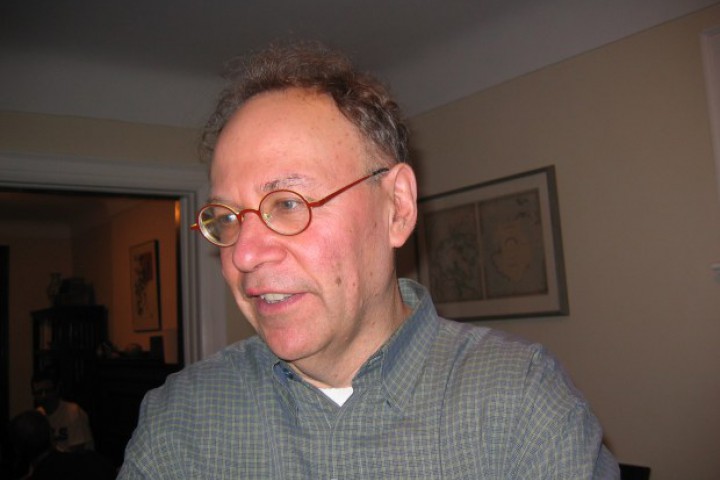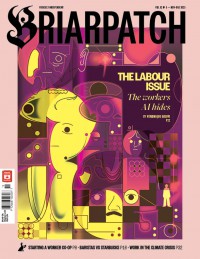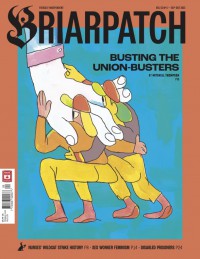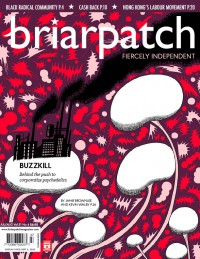Against TransformUS: A timeline of student resistance

The so-called TransformUS Process at the University of Saskatchewan was initially proposed to the university community in January 2013 at a University Council meeting. The proposed restructuring process was based on a neoliberal model of academic administration touted by American writer Robert Dickeson in a best-selling book called Prioritizing Academic Programs and Services. The process at the U of S included two research task forces: one administrative and one academic. Students – who tend to oppose cutbacks – were to be excluded from both task forces in keeping with the Dickeson model.
Nonetheless, students were at that initial meeting and we fought for representation. Of 50 positions, students were given three. Our voice is not reflected in the plans and documents that emerged.
The upper administration assured us that the Dickeson model would be tailored to the U of S context, but it wasn’t. Once the model was chosen, tokenistic town hall meetings and online forums were setup for student involvement, but students understood that all the major decisions had already been made.
At an April 2013 town hall students asked whether models other than Dickeson’s had been considered. The administration answered that they had not. The corporate American model had been the sole choice.

In August 2013 an open letter, signed by student leaders, was submitted to the administration and local media. The letter critiqued TransformUS, the labour practices associated with it (e.g., “perp walking” fired employees off of campus), and the lack of consultation with students.
Nothing changed.
In fall 2013, the U of S Students Council unanimously passed a non-confidence motion on TransformUS, with the full support of colleges not usually associated with student mobilization, including medicine, law, engineering, business, and agriculture, among others.
The recommendations of the two TransformUS task forces were released in December 2013, while students were in the thick of final exams.
In February 2014 a faculty member and long-time ally of students raised a non-confidence motion for TransformUS at the University Council meeting. At the meeting, the administration informed attendees that cuts were going to happen either way, and that if TransformUS was rejected, the administration would unilaterally assert the priorities for the university. This threat worked, and many faculty stood with the administration and against students. The non-confidence motion was defeated.

The full TransformUS action plan was released on April 30, 2014, just as students were leaving campus for summer. The action plan included the amalgamation of the colleges of Public Health, Dentistry, and Medicine. As is now well known, the Dean of Public Health Robert Buckingham wrote a public letter, titled “The Silence of the Deans,” opposing this restructuring.
The letter protested the muzzling of U of S deans, the administration’s bad-faith consultation efforts, and the expectation of uncritical loyalty to senior administration. Buckingham was promptly removed from his position as dean and his tenured academic post, only to be returned to his academic post two days later following a national outcry.
The media storm over Buckingham’s firing proved a galvanizing moment for student resistance to TransformUS. The outcry led to provost Brett Fairbairn’s resignation on May 18 and the firing of university president Ilene Busch-Vishniac days later.
Students organized a rally on short notice, relying only on Facebook to get the word out. Despite the fact most students were out of classes for the summer, 500 people showed up for the rally on May 20. We marched to the administration building where there were speeches followed by a DJ set.
Many people I spoke with after the event said this was their first political rally. The furor over TransformUS has now mobilized people beyond the usual circles of activists.
Organized resistance continues with a recent open letter submitted to interim president Gordon Barnhart receiving 1000 signatures from students, faculty, and community members as of this week.

Despite the University of Saskatchewan’s reputation as “the People’s University,” the current administration has no interest in adhering to that mandate. But we who organize are attempting to move it into that direction: we want this to be an institution that belongs to the people of Saskatchewan and the students, staff, faculty, and alumni who define this place.
That we have never been the People’s University does not mean that we never can be. Instead, the idea has what Paulo Freire called an untested feasibility. We have never really tried it, but we must fight for it.








3 Comments
I’ve been trying to tell smart people at the U of S to not just go after the “TransformUS” budget. You gotta go after the BofG’s. Puppets entertain us and when the strings get tangled it’s time to cut them loose and bring in the next puppet. My friend Marc Spooner worked tirelessly at stopping the “standardization model”. The gov’t simply rebranded the name and that’s what they are going to do with TransformUS. Join me and others at delegitimizing the BoG’s at the U o f S or at least the gov’t appointed ones and in the very least Chris Isaac who represents Cameco. Only by getting to know who’s who and separating the good from the bad will their power and legitimacy be diminished enough for the public good to catch it’s breath before it is completely strangled to death by the Wall. The technique I’ve been using is commenting on the MSM’s newspapers. When there isn’t any commenting section just copy and paste and paste on facebbook page. A while back, after we lost the Water War in Regina, I realized how necessary it was for me to not preach to the choir. That’s a big reason why we lost. But to use multiple means and get out there where you are not so loved but are more effective at bringing the right into the left. The left maybe right but they are highly ineffective at bringing the right people to the public good. Perhaps Dan knows of a way for the U of S to legally “Declare Independence” from the BoG’s? The language right now is the only thing that will change. Reactionary politics doesn’t necessarily have to mean fascism. It can also mean waiting to see then “REACT” how the gov’t tries to destroy the public good with the TransformUS lite version which is sure to happen.
From Keith Lee in Regina on May 28th, 2014 at 2:57pm
Correction needed from the editor. In my last post I wrote Grant Isaac not Chris Isaac. Chris Isaac is a singer I believe. However I can’t believe Chris Isaac is on the Board of Governors Cameco and ready to make a comeback in his singing career. Could you please correct it? Thank-you.
Keith
From Keith Lee in regina on May 28th, 2014 at 8:19pm
I heard Dan on cbc radio today. Note that I am not connected to this at all and don’t really care which way this goes.
That being said, the problem I had with his interview is at the end when Dan made it clear one of his concerns is how this would affect him getting a job. WTF is that? If that is the case, why bring all of this negative publicity against the UofS? Why support initiatives against the university you attend. If there is backlash, it is deserved… but I truly don’t believe that will be the case (unless the person wasn’t competing to begin with). You can’t suck and blow. Enough with the entitlted bs. Graduate, get a real job, do the best you can, change the world day by day through hard work. No sympathy here.
There are other issues too, but none worth writing about.
From hans in wherever on Jun 3rd, 2014 at 10:22pm